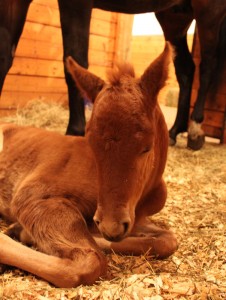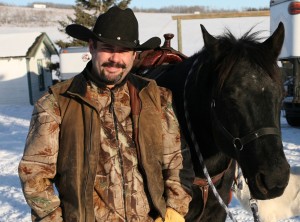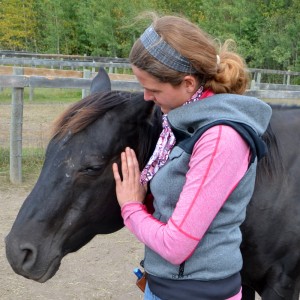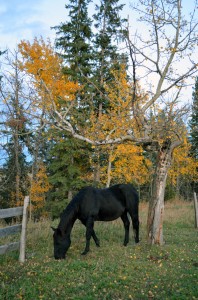Most, if not all of us, have horses that are, or have been, near to our hearts. For reasons that are generally personal, these horses endear themselves to us and we form bonds with them that are different and in many ways exceed the bonds we permit ourselves to form with other people.
Why is this?
I’ve spent many years working with groups of people and have had plenty of opportunity to observe how they interact with one another. And my conclusion is this: humans are good actors. We play the part to fit the situation. For example, we can be in a bad mood, but show up at work and pretend to be happy. When someone asks, “How are you?” ??we automatically reply “Fine, how are you?” without a second thought, even though we might not be fine at all.
In our interactions with people we’re continuously, and usually subconsciously, analyzing the reactions and expectations of the party we’re conversing with. We might not answer honestly, instead choosing to answer what the other person expects in order to steer a conversation in a certain direction. We use sarcasm. We cause others to think, “What does he really mean by that?”
We act. What this means to me is that people are seldom 100% honest. We go through our lives playing this game. But without 100% honesty there can never be 100% trust. We question, suspect. We talk about people behind their backs. We write things in emails and text messages that we wouldn’t dream of saying in a face to face conversation.
Humans, as social animals, are horrible!

Horses on the other hand, are like a breath of fresh air in a world stagnant with pretense. They are intelligent animals incapable of deceit. I know you’ll have some story about a dishonest horse. But think about it: a horse can only be a horse. A horse can only think like a horse. A horse can only act like a horse. So calling a horse dishonest, manipulative or my favorite: my horse has a behavior problem, is simply a method people have of personifying their horses to explain behavior they either don’t understand, or that they feel is amusing.
Horses are honest. As such their trust must be earned. Horses are capable of forming bonds with other horses and people which can be extremely close; you’ll find many examples in my writing to back that up. What makes a horse honest is that he cannot act, pretend or fake a mood. A true and honest relationship with a horse extends beyond actions. It goes into a realm that is, in it’s own way, spiritual.
I had someone say to me recently, “Animals are so awesome, they love us unconditionally.” Generally, I disagree. Most dogs I’ve ever met initially trust you until you give them a reason not to (predator-predator relationship). Horses are the opposite. They will not trust you until you prove you can be trusted (predator – prey relationship). There are obvious and overt conditions and actions that preclude a relationship with a horse. Additionally there are a multitude of subtle conditions that must be met before a horse will form a deep connection with a person.
I’d like you to consider this. People form bonds with horses because in the horse they find a trust and honesty that is pure. And that bond must be mutual; if you are honest with your horse and provide leadership in the way the horse understands and requires it, you can have a lifelong partner. What makes this bond so special is that it requires effort to achieve; it isn’t given unconditionally. You can’t be a human actor around a horse and expect to have a true connection with him. Forming a connection like that requires that you understand what his mental needs are and provide them. A bond like this requires that you are able to feel your horse on a deep psychological level, and in turn communicate empathically with him.
A relationship this honest and open will never exist until you can let your guard down and be honest and open with yourself.
Learning a horse on this level is a journey that might take years, but the payoffs are profound, moving and generally life changing. At least they have been for me.

Several years ago my gelding, Ty, broke his neck. We went down a long road of rehabilitation; initially he could barely walk as his spinal cord was compromised. As the years went by, he progressed: I have worked cattle on him and ridden him to the top of a mountain. We share a mutual understanding. I know, without a doubt, that he is aware that I’m responsible for saving his life. I see that in his eye. I feel it from him. In turn, that horse has taught me how to create a peaceful space for horses – an asset a herd leader must have – and a skill that I now employ when working with any horse.
Ty has taught me that faith, honesty and trust are real. Our relationship is deep. Ty probably understands it better than I do because his understanding isn’t clouded by guesswork, philosophy, reasoning or personification. It simply is what it is, and it’s pure. It’s that purity that takes my breath away when he, or any other horse, shows it. When working with horses I find that purity is an addictive component; it’s exhilarating. It’s energizing. It’s life.
But there are downsides to a relationship like that. The potential for worry. Loss. Guilt. On average our lives are longer than our horse’s lives by a factor of at least three. I was told by someone once, “If you care for that horse, she’ll die.” Well, she’ll eventually die anyway.
So will I.
And that said, there is a window of opportunity where our lives intertwine, intersect and even merge to an extent. It’s up to us how we use that window because it is of finite duration. It truly is an opportunity if you choose to take it. It’s an opportunity for us to explore, to learn. An opportunity for us to feel and experience the uniqueness of the horse that extends so much further than just riding, competing or working.
Careful, though, this is an addiction. But it’s a healthy one. It’s also not for everyone. People involved with horses run the gamut from those that put 100% priority on the horse to those that put 100% priority on themselves. The former are horsemen who are content to let the horse speak for their skill. Their efforts are reflected in the obvious connection they share with their horse, who is smooth and fluid and entirely content – no matter what the task. The latter would be people for whom the horse is a tool to advance them to a certain competitive level. They might employ a trainer for their horse and seldom interact with the horse between training sessions or shows. Most horse people will fall in between somewhere. Hopefully you find a spot where both you and the horse realize mutual and lifelong benefits.
The reason that I’ve been contemplating these thoughts is that several days ago I almost lost Ty. And it’s caused me to think about not only how special he is to me, but how much potential all horses have. They have the potential to be our most trusted friends. Our most honest friends. Whether we compete, trail ride or train, we are always building and exploring our relationship and commitment to each other.
While I was away, Ty was discovered by my house-sitter. He was lying on his side, unable to get up. He was shivering. She put a blanket over him, and called me and the vet. While the vet was on his way, I called him to discuss Ty’s previous neurological injuries so that he had a basis to treat him. Not being at home and not being able to provide help and support was a sickening feeling.
The vet asked me over the phone, “Is this horse special to you?” Meaning: I don’t like the look of this. I can euthanize him right now, if that is your choice. My response was simply, “He is.”

The vet was able to get Ty up and with the aid of good friends, put him in the round pen and treat him for colic. I now know that he didn’t colic and go down – he went down and colicked because he couldn’t get up. When I returned home the next day, I immediately called Jody – an incredible equine therapist and a good friend of mine. Jody spent an afternoon working on Ty and found two vertebrae and four ribs were out. Subsequently he was in a lot of pain. To compensate he was using his body in such away that he appeared to be a neurological disaster.
However, after treating him, and with subsequent daily treatment from me, Ty is getting noticeably better. Are we out of the woods? Not yet. But I can see the edge of the trees from here. In hindsight, what strikes me about this episode is that I feared the worst. Watching my equine mentor struggle to move and get up. Watching him lose his balance and fall over, but just keep trying…it was hard. I wasn’t going to give up until I had exhausted every possible attempt at helping him. Inside, though, part of me was preparing to say goodbye to a beloved friend. Ty however, had no intention of giving up. He is a source of strength to the herd and also to me.
Part of my mantra for life is: I will never have regrets. Part of ensuring living with no regrets is taking every possible opportunity, exploring every avenue, and more than that, I’m realizing, doing something to enrich the lives of others. I think that is a basic human instinct – probably instilled in us to preserve our species. With horses, I am convinced that is my purpose: through training and working with them, I can enrich their lives. The results speak for themselves: horses have more confidence, ability and freedom in motion. They realize success and reward, peace and contentment. They develop an attitude of try and want to work for you, no matter what your discipline or event.
It’s an amazing feeling to be able to provide those things to another living being. Oddly enough, now that I think about it, they have given me the exact same things.
When Ty eventually passes, I know that I will have done all I can to make his life the best it could have been. I know that he is aware of that. I will have made the best of that window of opportunity: we have learned from each other, and we have helped and supported each other. We have existed in a space of peace that we are able to create and share with each other. One look in his eye tells me that.

It’s difficult in our lives to devote enough time to the things we care about. It’s also easy to take something or someone for granted. And it’s understandable: we are busy with jobs, raising families, maintaining the farm or any number of countless tasks. It’s so easy to spread ourselves thin. In our busy lives it’s important to find valuable time to spend with our horses. To learn from them. To share with them. To give to them. They’re not dirtbikes to be used at an event and then put in the garage until the next race. They’re living, thinking, intelligent beings that have many many lessons to teach us.
Lessons about how to be a human being.
If you’re open to allowing yourself to make positive changes in your life – a horse has a wealth of information to show you how to do that.
It’s right there waiting for you. Make the most of it.
Scott Phillips, November 2014
